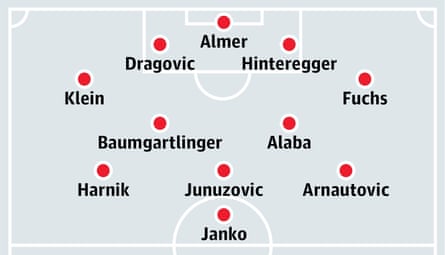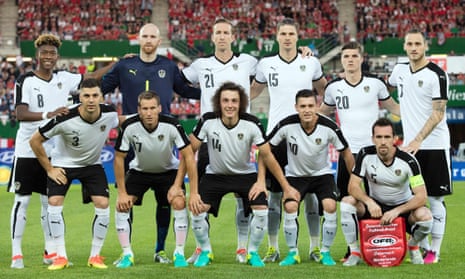This article is part of the Guardian’s Euro 2016 Experts’ Network, a cooperation between some of the best media organisations from the countries who have qualified for France. theguardian.com is running previews from three countries each day in the run-up to the tournament kicking off on 10 June.
Since the appointment of Marcel Koller as manager in 2011 Austrian football has experienced a renaissance. Having (briefly) appeared at Euro 2008 as a co-host, this is the first major tournament that Austria have qualified for since the 1998 World Cup but the impact made by Koller, a former Switzerland midfielder, is not limited to results.
Improvements were apparent when Koller introduced a 4-2-3-1 system, flexible enough to become 4-3-3, at all age-group levels. Before he arrived Austria had become a symbol of underachievement, paying the price for wretched coaching and a glaring absence of vision, but he is now blessed with a generation of highly talented, technical and tactically aware players, most of whom are based abroad.
The versatile David Alaba of Bayern Munich is the standout name while Marko Arnautovic has impressed in the Premier League with Stoke City, but the two key positions in Koller’s side are occupied by the defensive midfielder Julian Baumgartlinger and Zlatko Junuzovic. Werder Bremen’s central midfielder Junuzovic becomes vital when Austria win the ball back, driving forward and spreading the play wide to Arnautovic on the right or Stuttgart’s Martin Harnik on the left. While both Harnik and Arnautovic are notionally wingers, neither is afraid to support the centre-forward, Marc Janko.
Janko has been in rich goalscoring form for Basel and Austria this season, and has 22 goals in 33 appearances for his club side while his 26 international goals have come at a rate of just over one every second match. At 6ft 5in, however, it is his hold-up play, which enables both Junuzovic and Alaba – who normally plays in midfield – to move forward and become goal threats, that makes him the focal point of Koller’s side.
Traditionally Austria’s weak link, the full-backs are now an area of strength. The captain, Christian Fuchs, who arrives in France after his remarkable season with Leicester City, links up well with Harnik down the left, as does Florian Klein with Arnautovic on the right. Koller likes to employ a high-pressing game if Austria’s opponents are looking to build from the back, in which case he asks his goalkeeper Robert Almer to perform a sweeper role because, as his manager points out, “he has a quality left foot, great size and is experienced”. Should Austria’s opponents adopt more of a long-ball strategy, meanwhile, Koller’s side will exert pressure in midfield. The greatest concern comes when Baumgartlinger and Alaba find themselves too far advanced and the back four becomes exposed.
Nonetheless there are genuine reasons for optimism for Austria, who have been drawn in the same group as their neighbours and arch rivals Hungary, but while Koller’s first XI will pose a test for anyone at the tournament, the same can perhaps not be said about the rest of the squad.
Probable starting XI

Which Austria player is going to surprise everyone at the Euros?
Aleksandar Dragovic. For a player his age, Dragovic, is already as hard-nosed as anybody can expect to be. Only 25 years old, he has already won two Ukrainian titles championships with Dynamo Kyiv and three with Basel in Switzerland. The centre-back, who came close to joining Manchester United a few years ago, is coveted by major clubs from all over Europe but rumour has it that Dragovic will shortly fill the boots of Mats Hummels at Borussia Dortmund.
Which player is likely to disappoint the most?
Rubin Okotie. A member of Austria’s golden generation, who reached the semi-finals of the Under-20 World Cup in 2007 (Harnik, Junuzovic and defenders Markus Suttner and Sebastian Prödl were also part of that squad), the striker born in Pakistan has not really lived up to expectations. Now 28, he has never quite made the grade at a major club, though he can point to some bad luck with injuries. His contract with his current employers, the German second division side 1860 Munich – for whom he scored eight times in 32 league appearances this season – expires this summer. Although he did score two crucial goals in qualifying, against Montenegro and Russia, Okotie is generally ineffective and Austria could be in deep trouble if Marc Janko is injured or out of form.
What is the realistic aim for Austria at the Euros and why?
The fans’ expectations are very high, because Group F, which also contains Hungary, Iceland and Portugal, is seen as being relatively straightforward. But while Austria may be ranked above Hungary and Iceland by Fifa, they have little tournament experience, and reaching the last 16 would be a success. There is also the potential to reach the latter stages of the tournament given a bit of luck with injuries.
Florian Vetter writes for Der Standard.

Comments (…)
Sign in or create your Guardian account to join the discussion